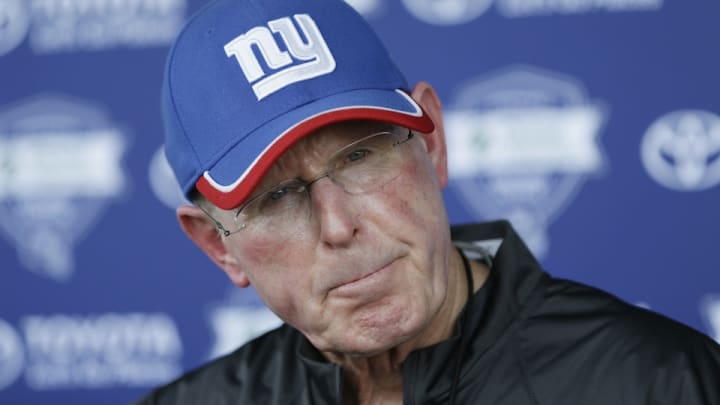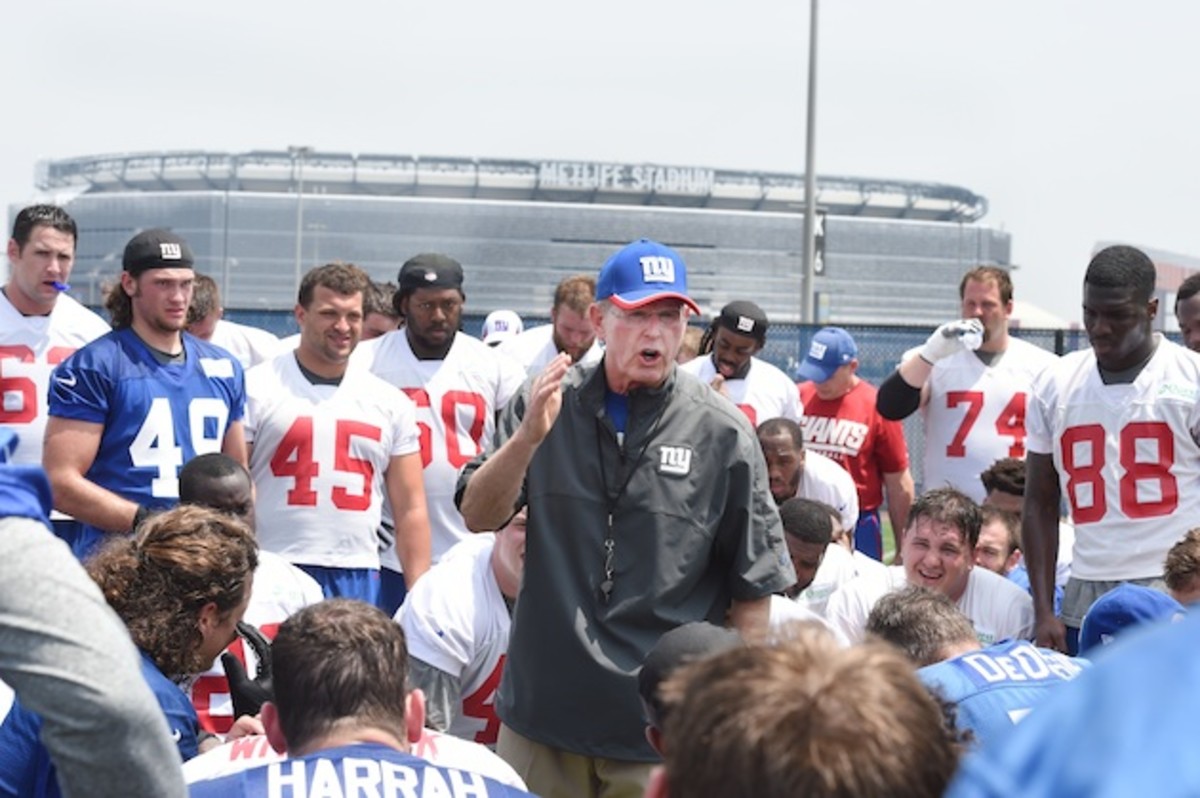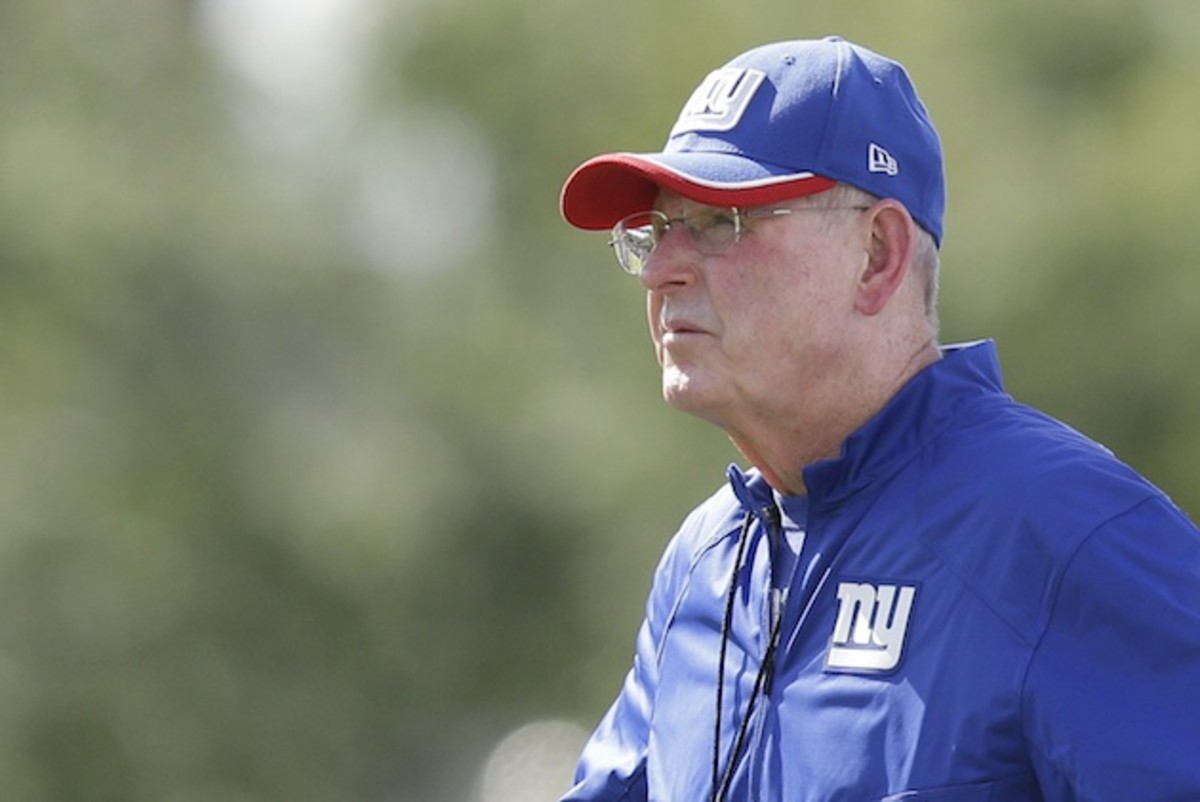Don't count out Tom Coughlin: His teams often succeed after slow starts

Tom Coughlin has never been one to hide his emotions when things go awry. The 69-year-old coach may have softened his disciplinary ways over the years, but when his players don’t execute to his atomic-level specifications, that face doesn’t lie.
Every Giants fan knows when to expect the Coughlin Face. The delivery might change — usually alternating between his standard “arms spread wide, imploring the football gods to explain what just happened” pose and the rarer “hands on hips, struggling to make sense of this madness” position — but what’s remained a cartoon-like constant is the shock cascading over his face. You’ll see it 15–20 times in a given game. Even when the Giants are playing well, the Coughlin Face is bound to make a quarterly cameo.
Then there are nights like Sunday’s inexplicable loss to the Dallas Cowboys. With his troops plumbing new depths of incompetence during the game’s waning minutes, Coughlin appeared lost in a fog of rage, confusion and disbelief. This coach plots out single second of every day, right down to the distribution of milk-to-Grape Nuts. He fines his players for showing up fewer than five minutes early to meetings. His world is order, and that order was unraveling right before his eyes.
• MORE: Giants drop to No. 24 in Week 2 Power Rankings
As Coughlin begins his 20th (and perhaps final) season as an NFL head coach, the greatest mystery of his career is how this man — hundreds of games and a pair of Super Bowls notched to his JC Penney belt—can still seem so surprised when things don’t go his way. For two decades, his squads have stood as the league’s ultimate agents of entropy, mucking up the status quo and sowing chaos across the land. Sunday night was far from his craziest loss, of course: Coughlin remains the only coach in NFL history to lose on a walk-off punt return. Conversely, a win against the highly favored Cowboys wouldn’t even have cracked the top-20 greatest upsets of his career. Which can be the case when you’re the only coach in history to lead a team that was outscored in the regular season to a Super Bowl win. This man exists to demolish the football’s carefully crafted logic, and he seems to be the only one who doesn’t realize it.

Is Tom Coughlin a great coach? Going strictly by the numbers, he may well be. If the Giants win six games this season, Coughlin could retire tied with Mike Shanahan for 12th place on the league’s all-time win list; eight wins would draw him even with his mentor, Bill Parcells. He’s won two titles and boasts a surprisingly strong .632 postseason winning percentage, fifth-best among coaches with at least 150 career wins. You may have heard of the four guys ahead of him: George Halas, Bill Belichick, Chuck Noll and Joe Gibbs.
Still, when evaluating Coughlin’s tenure — both in the regular season and the playoffs — the destination remains far less interesting than the journey. How does one manage to pile up such an impressive resume (in the world’s largest media market, no less) and still have his career be the subject of hem-hawed hand-wringing? Perhaps it’s because Coughlin has never really coached a truly dominant team.
Is the Manning Era as we know it already over?
In fact, the coach’s two greatest regular-season squads, the ’99 Jaguars and the ’08 Giants, remain his two greatest failures. The Jaguars were built upon a five-year foundation of steady improvement (dating back to Jacksonville’s ’95 inaugural campaign), and appeared invincible, losing to just one opponent the entire season. Unfortunately, they lost to those Tennessee Titans three different times — twice in the regular season, and ultimately in the AFC Championship Game. The ’08 Giants, meanwhile, looked to be one of the most well-rounded title-defending clubs in years, until the Plaxico Burress nightclub shooting and declining late-season play sent them careening down the tubes.
Regular-season dominance capped off by playoff disappointment makes up one side of what I call The Coughlin Phenomenon. For many fans, an 11–5 record stands as a sort of line of demarcation between good playoff teams — the genuine contenders who deserve to be there — from the mediocrities who may have lucked into a postseason berth. Five times Coughlin has taken a team with a record of 11–5 or better into the playoffs. His postseason record with those teams: 2–5.

Now compare that to the four teams he’s carried into the postseason with a record of 10–6 or worse:

That’s a 10–2 playoff record with two different franchises, spread out over three decades. Those two Giants championships get most of the attention, and rightly so, but don’t undersell the job Coughlin did with the ’96 Jaguars. Not only did he win two playoff games with a club in only its second year of existence, he went into Denver and beat a seemingly invincible Broncos team that would go on to win the next two Super Bowls. In fact, it was the only postseason loss of the Mike Shanahan-John Elway era, and the final postseason loss of Elway’s career.
If anything, this will be Tom Coughlin’s legacy: a coach who made his legacy by being a singularly successful scourge of NFL legends, rather than a legend himself. He didn’t build dynasties; despite his reputation as a disciplinarian, his teams were inconsistent. But those teams also stood in the paths of juggernauts and didn’t give an inch. He beat Elway at his best and ended Dan Marino’s career. He has won two playoff games in the impenetrable ice fortress known as Lambeau Field, beating two different quarterbacks destined to end up in Canton. And that’s before we even get to the pair of upsets he pulled off against Bill Belichick, Tom Brady, and the dynastic Death Star that is the New England Patriots.

In a sport where greatness is so often measured by accuracy, precision and control, this straight-laced, by-the-book curmudgeon has been the wily wild card, the one variable we could never quite predict. His Giants may very well collapse under the weight of injuries, talent deficiencies and one soul-crushing opening loss — a confluence of crap storms that could finally force the old coach into retirement. Then again, what’s to say they won’t rally once again, flying under the radar long enough to hone their stealthiness into postseason formidability? Stranger things have happened, after all—many of them ending with Big Blue looking terrific.
Whatever craziness this season heaps upon these Giants, expect Tom Coughlin to react as he always does: like a cross between someone snapped out of a 40-year coma inside Cirque du Soleil, and a man who just watched one of his grandkids toss his signed copy of Patton’s autobiography straight into the Thanksgiving fire. Maybe this has been Coughlin's plan all along. A coach is a kind of teacher, after all. By throwing his hands up in disgust and bewilderment, he's playing the role of wise old Socrates, screaming "What the hell is going on and why?"— until we arrive ourselves at perhaps the ultimate of football truths: This game doesn't make any dang sense, and it probably never will.

